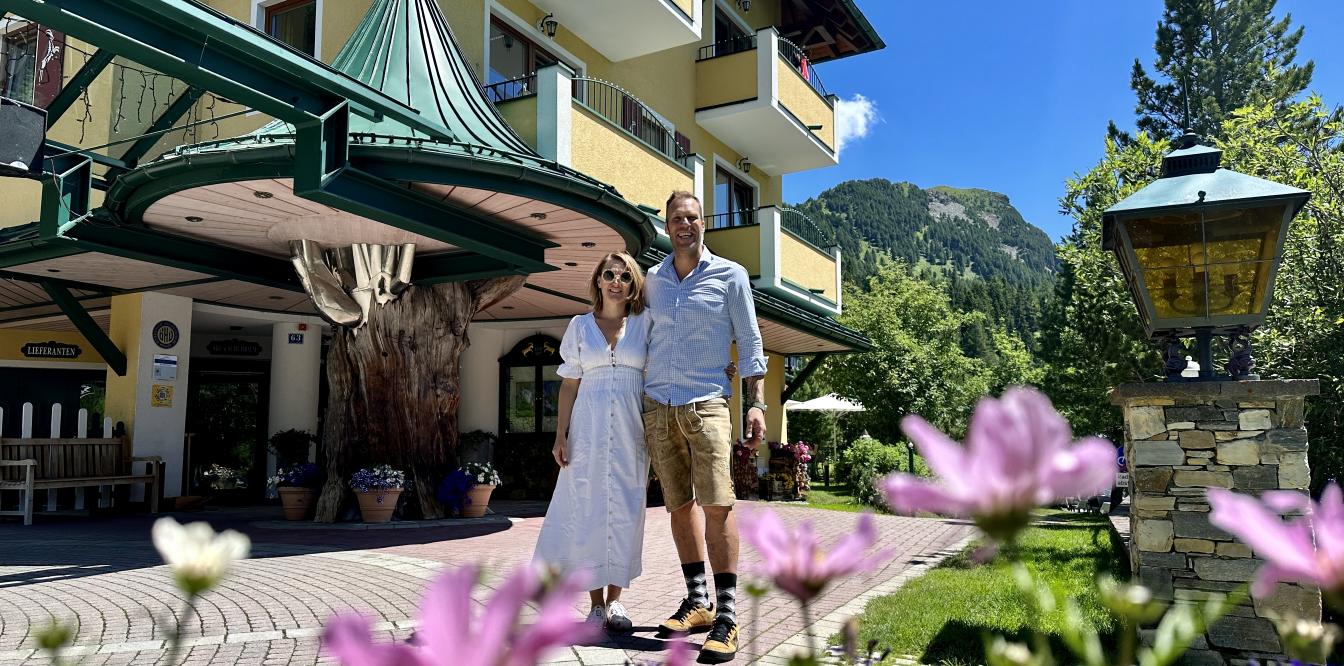
An interview with the management of the Seehotel Jägerwirt (Part 1):
Sabine and Alex on history, their time in Bali and their return
Tradition and modernity. Consistency and a spirit of optimism. Austrian hospitality and globetrotter flair. The Seehotel Jägerwirt is a hotel of contrasts. And it brings together what at first glance seems incompatible, but which actually come together. And this unique conglomerate is ultimately what gives the hotel its incomparable charm. This also has a lot to do with the fifth generation, which took over the Jägerwirt at the end of 2022: We, Sabine and Alexander Springenschmidt, want to both respect the beginnings and traditions of the venerable establishment and allow new impulses to take effect. In the first part of the interview, we reveal exactly what we mean by this, where the history of the hotel began and why we were inspired by the island of Bali.
Let's dive into the history first: How long has the Seehotel Jägerwirt been around?
Sabine: For almost 120 years. Johann Brandstätter laid the foundation stone when he bought the former stonemason's house of Counts Hugo Lazy and Henckel von Donnersmark in 1905. He wanted to run it as a "tourist house", especially during the cold season, and therefore furnished the first rooms. In 1912, the nearby Seewirt was finally leased.
What happened next? And what's the story behind the name "Engländer-Lift"?
Sabine: In 1930, the next generation, Hans Brandstätter, the son of the founder and a passionate hunter, established the property as the "Jägerwirt". Half a hectare of alpine pasture land was added, as well as further guest rooms and a dining room. At that time, many summer visitors from Austria had already chosen Turrach as their vacation destination. And after the war, winter tourism began to take off as British troops built the first ski lift in the region. This is why it is also known as the "English lift". They later gave it to my grandfather Siegfried. He took over the Seehotel Jägerwirt in 1963 together with my grandma Elisabeth and continued to expand it. In the 1980s, they handed over the business to the fourth generation, my parents Siegfried and Gerda. Many major investments and renovations followed. You could say that they rebuilt the house from top to bottom. In recent years, my brother was managing director for a while - but he wanted to change career.
Now you are at the helm. Was it always clear to you, Sabine, that you would take over the business?
Sabine: No, absolutely not. I have always helped out in my parents' hotel and attended hotel management school, but later completed a degree in business and marketing in Vienna. I found tourism itself interesting, but I would have rather seen myself in tourism marketing than in my own business. But after my brother was no longer interested in managing the business, the question arose: who would do it? So my parents asked us.
You had just returned from Bali at the time. What brought you there and what did you do there?
Alex: Yes, exactly. It all started with a job offer from me in Bali. And somehow one thing led to another: We found a suitable plot of land that we actually only wanted to have for ourselves. There were two houses on it, a private house and a guest house. Friends and acquaintances kept using the guest house and coming to visit. Soon our friends' friends were also staying there. And their friends in turn. At some point, it was strangers who moved into the house for a few days.
Sabine: And because it went so well, we decided to turn it into a hotel and build bungalows. So you could say that when I was 16, I told myself I would never end up in the hotel industry. Eight years later, however, I built my own hotel in Bali. Somehow, being a host is in my DNA after all.
You then spent a total of 17 years in Bali, ran a hotel, a vegan restaurant, a surf school and a yoga studio and built the first downhill bike park in Southeast Asia. So why did you return?
Sabine: The main reason was and is our children. We wanted to give them a wonderful childhood in an unspoiled natural environment.
Alex: We also spent a short time in Austria for family reasons and our children didn't want to go back to Bali. Because here in Austria they could run around freely and ride their bikes everywhere. So it soon became clear to us that we would be returning. We ran our hotel from Austria for a while and later leased it out. It's a great fit for us at the moment. Everything else remains to be seen.
What fascinated you about Bali and what do you like to think back on?
Sabine: Above all, the friendliness, warmth, calmness and helpfulness of the Balinese people. We also experience this warm hospitality at the Seehotel Jägerwirt.
Alex: And of course the sea. For me as an enthusiastic wave rider, Bali was a dream.
And vice versa: What did you miss from Austria in Bali?
Sabine: At the very beginning, of course, you don't miss anything because everything is new and you're electrified. Only gradually and the deeper you immerse yourself in the country's culture do you start to compare and miss some things. For example, the rights you have in Austria, the structure, the clean drinking water, the waste separation, proper power lines, the privilege of an e-card or medical care in general.
Alex: That's also the reason why we believe that people should travel more in general. Simply get away from home and their familiar surroundings. Then they would appreciate it all much more and see the luxury we live in.
You are now the Managing Director of Seehotel Jägerwirt - what is so great about the hotel business?
Sabine: Every day is different, every guest is different. And that's the exciting thing about this job and this industry. A certain daily thrill, if you like.
Alex: The human element is also incredibly interesting. You have to deal with so many different characters - in the team and with the guests. At the same time, as the boss you have to remain the center of attention. You have to be able to listen, know who and what you give how much space to, find solutions, but also shout "Stop!" sometimes.



